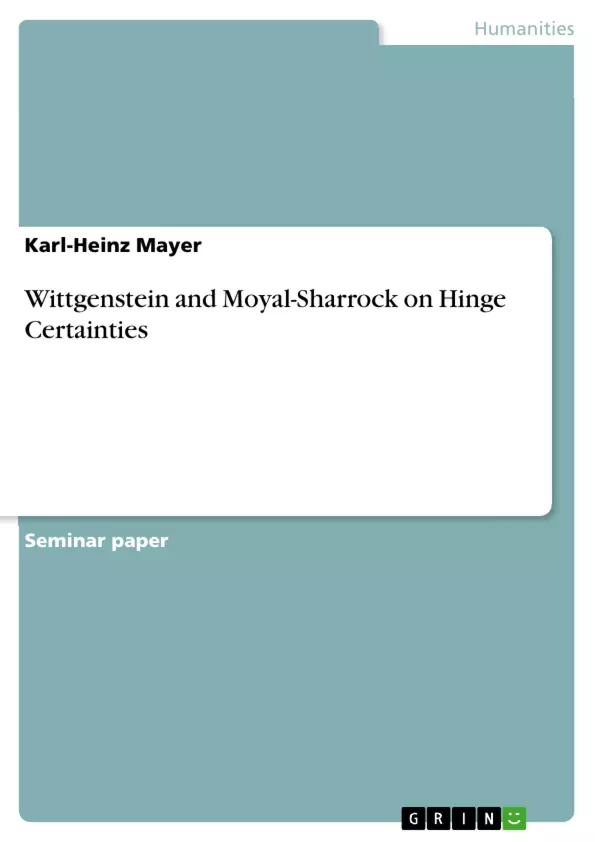Wittgenstein’s use of the word “hinge” for intrinsic certainties, which are forming an unconscious, unjustified foundation of our acting, has spurred an intense discussion in contemporary epistemology. In the build-up of secondary literature about Wittgenstein’s late collection of reflections that his literary executors published under the title On Certainty, Danièle Moyal-Sharrock plays an important role with her book “Understanding Wittgenstein’s On Certainty” (2005) and a number of other publications.
In her book, she has placed particular weight on the concept of hinges, ascribing to them eight particular properties and vigorously denying them the status of being propositions. Other epistemologists have responded and articulated deviating views.
The debate is still going on and this paper attempts to explain, first and foremost, what Wittgenstein wrote about hinges and the concepts interrelated to them, such as doubt, certainty, foundation, and acting. Then I’ll summarize, and partly criticize Moyal-Sharrock’s position. I shall argue that her accentuation of the nonpropositionality of hinges is a bit exaggerated, a point of view that is also confirmed by some counter-arguments by Annalisa Coliva, who suggests a conciliatory resolution of the conflict. Finally, Moyal-Sharrock gets the last word, though not entirely convincing.
Inhaltsverzeichnis (Table of Contents)
- 1. Introduction.
- 2. Wittgenstein's Hinges in On Certainty
- Wittgenstein on Hinges
- Wittgenstein on Doubt
- Wittgenstein on Certainty
- Wittgenstein on Foundation
- Wittgenstein on Acting
- 3. Moyal-Sharrock's Interpretation of Hinges
- 4. Annalisa Coliva on Hinges
- 5. Conclusion
- 6. References
Zielsetzung und Themenschwerpunkte (Objectives and Key Themes)
This paper examines the concept of "hinge propositions" as introduced by Wittgenstein in his late work On Certainty. The author focuses on the role of these propositions in forming the basis of our convictions and actions, particularly in relation to skepticism. The paper then analyzes the interpretation of hinges by Danièle Moyal-Sharrock and explores contrasting views presented by Annalisa Coliva.
- The nature and function of hinge propositions in Wittgenstein's epistemology
- The relationship between hinges and doubt, certainty, and action
- Moyal-Sharrock's interpretation of hinges and their nonpropositional status
- Coliva's counterarguments and proposed reconciliation
- The ongoing debate surrounding the concept of hinges in contemporary epistemology
Zusammenfassung der Kapitel (Chapter Summaries)
- Chapter 1: Introduction
This chapter introduces the concept of hinge propositions, highlighting their significance in contemporary epistemology. It emphasizes the importance of Danièle Moyal-Sharrock's contributions to the debate and outlines the paper's main objectives, which include exploring Wittgenstein's original ideas about hinges and analyzing the differing perspectives of Moyal-Sharrock and Annalisa Coliva.
- Chapter 2: Wittgenstein's Hinges in On Certainty
This chapter delves into Wittgenstein's concept of hinges, analyzing his various discussions surrounding doubt, certainty, foundation, and action. It examines key aphorisms from On Certainty and highlights the role of hinges as foundational elements in our knowledge and beliefs.
- Chapter 3: Moyal-Sharrock's Interpretation of Hinges
This chapter focuses on Moyal-Sharrock's interpretation of hinges, exploring her key arguments regarding their nonpropositional status. It examines her detailed analysis of hinge properties and presents a critical evaluation of her position.
- Chapter 4: Annalisa Coliva on Hinges
This chapter introduces Coliva's perspective on hinges, highlighting her disagreements with Moyal-Sharrock's interpretation. It explores Coliva's counterarguments and her proposed reconciliation of the conflicting views on hinges.
Schlüsselwörter (Keywords)
Hinge propositions, Wittgenstein, On Certainty, skepticism, epistemology, doubt, certainty, foundation, action, Danièle Moyal-Sharrock, Annalisa Coliva, nonpropositionality.
Frequently Asked Questions
What are "hinges" in Wittgenstein's epistemology?
"Hinges" are intrinsic certainties that form an unconscious, unjustified foundation for our acting and convictions, as discussed in Wittgenstein's "On Certainty".
What is Danièle Moyal-Sharrock's main argument about hinges?
She argues that hinges are nonpropositional in nature, meaning they are not statements that can be true or false, but rather a way of acting.
Why does Moyal-Sharrock deny the status of hinges as propositions?
She believes that hinges function as the ground of our language games and therefore cannot be part of the language game itself as provable propositions.
How does Annalisa Coliva respond to Moyal-Sharrock's view?
Coliva suggests a more conciliatory resolution, arguing that the nonpropositionality might be exaggerated and that hinges can be understood in a way that bridges both views.
What is the relationship between hinges and doubt?
According to Wittgenstein, doubt is only possible where there is certainty; hinges are the certainties that must stay in place for doubt to even make sense.
What role does "acting" play in this epistemological debate?
Wittgenstein emphasizes that at the foundation of our beliefs lies not a thought or a proposition, but a way of acting, which Moyal-Sharrock uses to support her nonpropositional interpretation.
- Arbeit zitieren
- Dkfm., BA Karl-Heinz Mayer (Autor:in), 2014, Wittgenstein and Moyal-Sharrock on Hinge Certainties, München, GRIN Verlag, https://www.grin.com/document/273347



